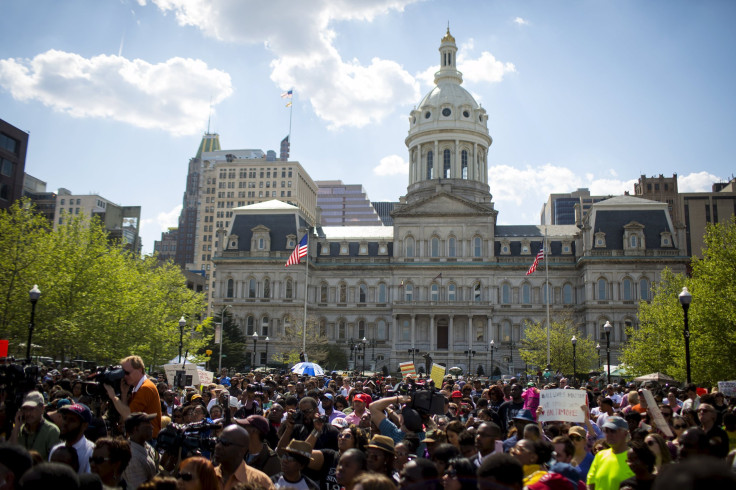After Mass Arrests During Freddie Gray Protests, Baltimore Public Defender To Challenge 'Excessive' Bail Amounts

About a week after demonstrations in Baltimore morphed into riots, some protesters are still being held in jail, unable to post bail -- with little to do but wait, Maryland Public Defender Paul DeWolfe said Tuesday. The bail amounts, which he termed "excessive," violate the state constitution, he said.
All told, at least 486 people were arrested amid the demonstrations. Since then, a growing chorus of voices has raised questions about whether the arrests were warranted. “We have identified a number of cases in which people are being held on excessive bail,” DeWolfe said, adding that the office is analyzing and choosing lead cases.
The protests and riots in Baltimore were in response to the April 19 death of Freddie Gray, 25, who died in police custody one week after being arrested illegally last month.
DeWolfe said bail amounts for protesters have been set between $10,000 and $100,000 in most cases, with one protester facing a $500,000 bail amount, the Washington Post reported. Such bail amounts, even if the actual payment to secure release is a small percentage of the total, can be quite hard for low-income defendants to pay.
'Systemic Problem'
“That sets up a situation where people get punished before they are even convicted,” DeWolfe said. His office plans to file habeas corpus petitions against the excessive bail amounts, which DeWolfe described as a “systemic problem.”
Prosecutors who made the bail requests, and the District Court commissioners who make bail decisions, were not immediately available for comment Tuesday. The Baltimore city state’s attorney’s office commented on its process in a statement April 28, following arrests related to the unrest. “We will prosecute each case fairly and hold those responsible for the violence in the city accountable,” the statement said.
DeWolfe's comments came just days after his office filed habeas corpus petitions on behalf of dozens of protesters who were held, without charging papers, for longer than the usual 24-hour period allowed. Republican Gov. Larry Hogan had extended the holding period to two days, which the public defender’s office challenged with the petitions. Three defendants made it before Judge Charles Peters, who ruled Monday that Hogan had not violated the Maryland Constitution. Peters said court procedures had been violated, but he said the number of arrests had created a backlog of cases and the state's judicial system did not deliberately hold the inmates longer.
More than 100 people were released last week without charges -- after being jailed for two days -- following the petitions. The fact that people left jail after two days without knowing why they were held, “speaks to the fact that they were being arrested illegally or at least they have a right to know what they’ve been charged with,” DeWolfe said.
DeWolfe wasn’t able to estimate the number of protesters still being held in jail on Tuesday because they were unable to pay bail. Typical charges that protesters faced, he said, included second-degree assault, rioting, fourth-degree burglary and malicious destruction of property. Baltimore's WJZ-TV reported that some of those arrested during the riots could be held for months because of their inability to post bail.
Large amounts of arrests also took place elsewhere during similar protests -- including last year's demonstrations surrounding the deaths of Michael Brown in Ferguson, Missouri (78 arrests in one night) and Eric Garner in New York City (300 arrests in two days after a grand jury decision in November). Brown, 18, was fatally shot by a white Ferguson police officer, while Garner, 43, died as a result of an illegal choke hold by a New York City police officer.
'Things Changed'
Monique Dixon, senior policy counsel for criminal justice at the NAACP Legal Defense Fund (LDF), said that arrests during the Baltimore protests became particularly aggressive after the city implemented a 10 p.m.-to-5 a.m. curfew May 1 and police officers reduced the buffer time allowed for citizens to return home.
“Things changed Friday and Saturday night [May 1 and 2], when 10 o’clock struck and people were in the street,” Dixon said. “Police didn’t give community members the time from before.”
She said police shifted to allowing just five to 10 minutes of buffer before making arrests. LDF officials, along with partners, were serving as legal observers to the protests, watching for potential conflict between police and the public. Dixon said 13 observers were arrested, despite wearing clothing that indicated their observer status. Most of the people who received citations for curfew violations have been released, Dixon said.
The Washington Post reported that 87 percent of jail inmates in Baltimore are there pretrial, while nationally 62 percent of inmates have been convicted of a crime. DeWolfe said that oftentimes high bail amounts divide people into “those that have resources, and those that don’t.”
© Copyright IBTimes 2025. All rights reserved.






















